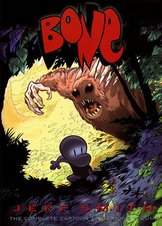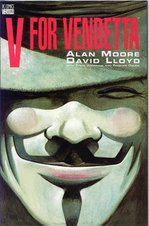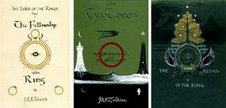I have already expressed my dissent to some of the opinions in this article pertaining to video games. But the authors also attack the film medium and the sci-fi and fantasy genres. This heresy must be dealt with. First, film. Zengotita writes, "I worry that games have the same effect on the imagination that movies have." Her argument is that the book version of a story is always better than the movie. With most film adaptations, I agree. However, what about original movies? "Crouching Tiger, Hidden Dragon," for example, is an excellent commentary on the Kong-fu genre. "The Matrix" is very fitting for discussing deconstructionism (the sequels are terrible). Furthermore, if movies are so detrimental to the imagination, how is it that I continue to analyze and re-interpret the original Star Wars Trilogy? Because I'm an uber-geek. But it's also because, like a good novel, a good film tells a story that leaves room for imagination.
Second, Kostor claims the sci-fi and fantasy genre's are plot driven and formulaic. According to Avrich, genre fiction (which only seems to include sci-fi and fantasy) is not very good at developing characters. At this point, their "debate" seems more like an unfounded rant about anything the authors can connect to video games. Have they forgotten that all literature falls into some sort of genre? Have they forgotten that Victorian literature is notoriously plot-driven? If the genre's of sci-fi and fantasy are so limited in terms of character, what do they think about Douglas Adam's work? Phillip Dick? Mary Schelly?
matt

us

Jeff Smith's "Bone"
About Me


My blog's watchdog
Blog Archive
-
▼
2006
(27)
- ► 12/17 - 12/24 (1)
- ► 12/10 - 12/17 (6)
- ► 12/03 - 12/10 (2)
- ► 11/26 - 12/03 (1)
- ► 11/19 - 11/26 (1)
- ► 11/12 - 11/19 (1)
- ► 10/29 - 11/05 (2)
- ► 10/22 - 10/29 (1)
- ► 10/15 - 10/22 (1)
- ► 10/08 - 10/15 (3)
- ► 10/01 - 10/08 (2)
- ► 09/24 - 10/01 (2)
- ► 09/17 - 09/24 (2)
- ► 09/03 - 09/10 (1)
www.flickr.com
This is a Flickr badge showing public photos from oldman.fuentes. Make your own badge here.



7 comments:
You make some really valid points here, Matt, and in your previous post as well. I mean, I love Jane Austen, but you would be hard-pressed to support the opinion that her work isn't formulaic. And anyone who says that science fiction is formulaic and lacks developed characters needs to read some Ursula K. LeGuin. The Dispossessed is one of my absolute favorite novels. It's very well written, nuanced, thought-provoking. If you haven't read it, you should pick it up some time.
Thanks Tracie, I just read A Wizard of EarthSea-very cool. Doctor Stearns recommended The Left Hand of Darkness last semester. The Dispossessed will be added to my book sale list.
matt
Matt,
I love the Twilight Zone episodes! It irks me that people could claim that fantasy/sci-fi isn't worth reading. To my knowledge, these episodes delve deep into human nature and provide significant social commentaries. In this way, I disagree completely that visual media such as film or TV is only produced for shallow entertainment purposes. Just last night, a commentator on MSNBC discussed one of these episodes in order to make the point that when people are driven to fear and suspect one another, they needlessly destroy themselves. As a teacher, I can't wait to incorporate sci-fi into my classroom; it's about time we freshen our traditional book list.
Nat
LEFT HAND OF DARKNESS and THE DISPOSSESSED...winners! Yes! KES
Matt, I really like your project topic. Blog about it! KES
I completely agree with you Matt. You're identifying a classist notion of literature (of art in general, really). I wonder where people acquire this classist notion of literature?
Well, anyway, there is certainly a different aesthetic at work in "literary" texts than popular ones, and yet a third aesthetic at play in experimental art, which fits in neither category.
Pierre Bourdieu has some interesting things to say about this issue, as, of course, does Raymond Williams. These founding figures of cultural studies become integral to the way we now study popular culture from sci fi and video games to baseball and fast food.
Matt, what's new? Any insights from that article I forwarded from Dr. K.? KES
Post a Comment